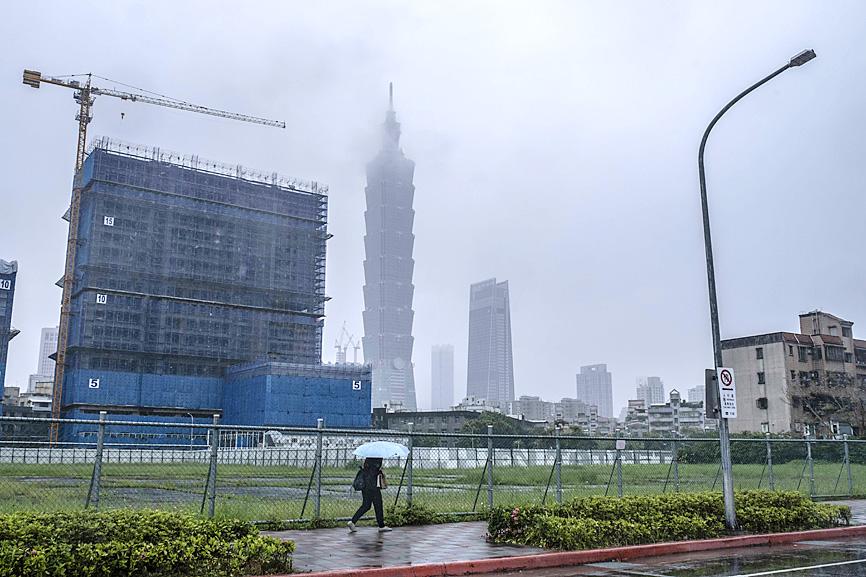Housing affordability grew worse in the first quarter, as the average mortgage burden climbed by 0.52 percentage points to 38.35 percent nationwide, a report released yesterday by the Ministry of the Interior showed.
The data suggest that mortgages accounted for a big chunk of the disposable income of households on average and this would worsen after the central bank raised interest rates twice and increased the mortgage burden by 1.5 percent.
The ministry classifies mortgage burdens as follows: below 30 percent, reasonable; higher than 30 percent, slightly high; more than 40 percent, relatively high; and more than 50 percent, overly high.

Photo: Lam Yik Fei, Bloomberg
Mortgage burdens in Taipei constituted 64.91 percent of household incomes, retreating from 65.09 percent three months earlier as housing prices became less expensive at 16.22 times the average household income, the ministry said.
Mortgage burden in New Taipei City ranked second at 51.45 percent, gaining 1.43 percentage points from the preceding quarter, the ministry said.
During the first three months of the year, mortgage burden rose by 1.58 percentage points to 45.08 percent of household income in Taichung, where housing prices were 11.26 times the average household income, the ministry said.
Meanwhile, Yilan, Hsinchu and Changhua counties, as well as Tainan and Kaohsiung, all saw mortgage burdens surpass 35 percent, but the figure in Taoyuan declined a fractional 0.26 percentage points to 31.5 percent.
Keelung, Chiayi County and Yunlin County are among the few in Taiwan where the mortgage burden remained below the reasonable threshold of 30 percent, the ministry found.
The report also showed that the home price index, which gauges fluctuations in residential property values in the nation, rose 2.99 percent from a quarter earlier to 121.01 in the first quarter.
The ministry attributed the increase to robust economic growth, low interest rates and inflationary expectations.
In the January-to-March period, Kaohsiung and Taichung saw the largest increase in the home price sub-index among the six special municipalities, rising 4.7 percent and 3.65 percent respectively from the preceding quarter, data showed.
The sub-indices for Taoyuan and Taipei saw the lowest increases of 2.7 percent and 1.91 percent respectively, the data showed.
Analysts said housing price changes would not affect the mortgage burden of existing homeowners even though price corrections might mitigate the burden of new borrowers.
Despite headwinds ahead for the market, housing prices would hold firm, because sellers believe property is a good defense against inflation and economic upheavals, they said.
Additional reporting by CNA

MULTIFACETED: A task force has analyzed possible scenarios and created responses to assist domestic industries in dealing with US tariffs, the economics minister said The Executive Yuan is tomorrow to announce countermeasures to US President Donald Trump’s planned reciprocal tariffs, although the details of the plan would not be made public until Monday next week, Minister of Economic Affairs J.W. Kuo (郭智輝) said yesterday. The Cabinet established an economic and trade task force in November last year to deal with US trade and tariff related issues, Kuo told reporters outside the legislature in Taipei. The task force has been analyzing and evaluating all kinds of scenarios to identify suitable responses and determine how best to assist domestic industries in managing the effects of Trump’s tariffs, he

TIGHT-LIPPED: UMC said it had no merger plans at the moment, after Nikkei Asia reported that the firm and GlobalFoundries were considering restarting merger talks United Microelectronics Corp (UMC, 聯電), the world’s No. 4 contract chipmaker, yesterday launched a new US$5 billion 12-inch chip factory in Singapore as part of its latest effort to diversify its manufacturing footprint amid growing geopolitical risks. The new factory, adjacent to UMC’s existing Singapore fab in the Pasir Res Wafer Fab Park, is scheduled to enter volume production next year, utilizing mature 22-nanometer and 28-nanometer process technologies, UMC said in a statement. The company plans to invest US$5 billion during the first phase of the new fab, which would have an installed capacity of 30,000 12-inch wafers per month, it said. The

Taiwan’s official purchasing managers’ index (PMI) last month rose 0.2 percentage points to 54.2, in a second consecutive month of expansion, thanks to front-loading demand intended to avoid potential US tariff hikes, the Chung-Hua Institution for Economic Research (CIER, 中華經濟研究院) said yesterday. While short-term demand appeared robust, uncertainties rose due to US President Donald Trump’s unpredictable trade policy, CIER president Lien Hsien-ming (連賢明) told a news conference in Taipei. Taiwan’s economy this year would be characterized by high-level fluctuations and the volatility would be wilder than most expect, Lien said Demand for electronics, particularly semiconductors, continues to benefit from US technology giants’ effort

‘SWASTICAR’: Tesla CEO Elon Musk’s close association with Donald Trump has prompted opponents to brand him a ‘Nazi’ and resulted in a dramatic drop in sales Demonstrators descended on Tesla Inc dealerships across the US, and in Europe and Canada on Saturday to protest company chief Elon Musk, who has amassed extraordinary power as a top adviser to US President Donald Trump. Waving signs with messages such as “Musk is stealing our money” and “Reclaim our country,” the protests largely took place peacefully following fiery episodes of vandalism on Tesla vehicles, dealerships and other facilities in recent weeks that US officials have denounced as terrorism. Hundreds rallied on Saturday outside the Tesla dealership in Manhattan. Some blasted Musk, the world’s richest man, while others demanded the shuttering of his